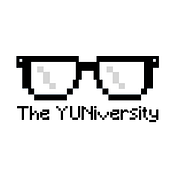The YUNiversity

The YUNiversity
Your friendly neighborhood grammar bro. I blog and tweet about grammar, vocabulary, writing, and LOLs. @The_YUNiversity www.TheYUNiversity.net

Your friendly neighborhood grammar bro. I blog and tweet about grammar, vocabulary, writing, and LOLs. @The_YUNiversity www.TheYUNiversity.net